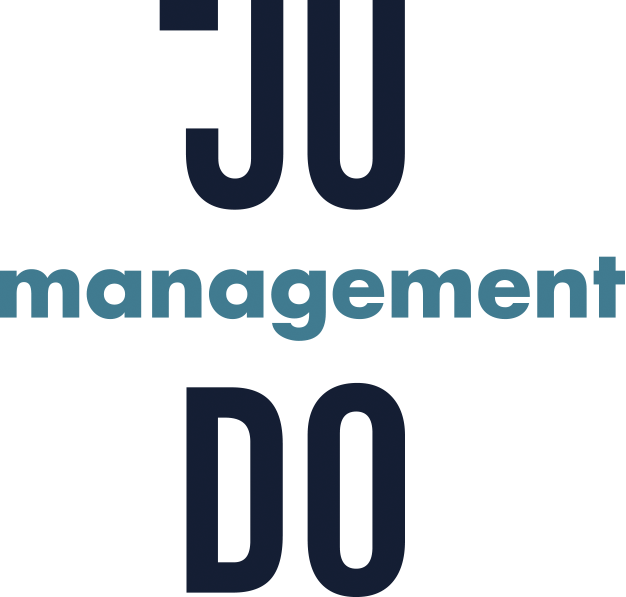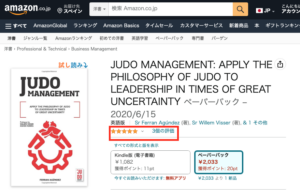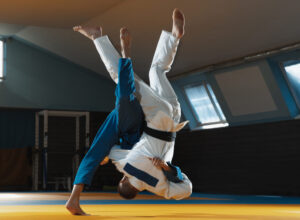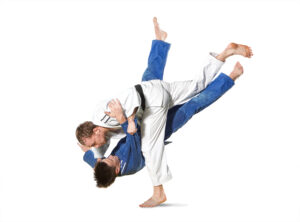“Sport and professionalism” is the keynote speech of Willem Visser, International Lecturer 8th Dan Judo IJF, at the International Congress, Sport Science and Research Institute Tehran; (9/11 – 12/11 2020).
There are a lot of definitions of sport.
- A total of activities pointed on physical and mental efforts achievement oriented.
- A social phenomenon connected with contest and competition elements.
- ‘Playful’ physical contests (Guttmann 1978.)
- Contest not to achieve a special benefit, which is not only a physical activity, but also an intellectual activity (Guttmann and Mandell).
In the mentioned definitions here above is ‘contest’ a main issue, but we practice also sport if we are jogging, skating, horse riding and cycling without being in a contest or competition.
In this context it is also necessary to mention, that sport can be considered as game.
There is a very interesting definition of game:
Game is voluntary action or activity, performed within borders of time and place according to voluntary accepted and binding rules, with the aim in itself and with a feeling of tension and joy and an idea of being different than normal life. (Huizinga).
So in this definition is tension and joy and being different than normal life, more important than performance and achievement.
This old definition cannot be used in the present time, if we speak about sport.
A modern definition of sport is: competition in all kind of physical and mental activities, in which ambition, efforts, overcoming resistances lead to results. Results can be objective (championships) or subjective, personal aims or goals.
Sport can be seen as education game in childhood and youth.
Sport can be seen as competition between individuals or teams.
Sport can be seen as recreation. (see also the definition of Huizinga.)
Sport can be seen as cultural physical activity. (Martial arts, dancing, tai chi etc.)
Sport can be used for neutralizing aggressive feelings.
Sport can be used for burning superfluous energy.
Also for professionalism there are a lot of definitions.
- That which the profession typifies.
- Aspects that makes the profession.
- Related to the profession.
- Craftsmanship, skill.
But also:
- A professional is: Specialist, honest, to be able and willing to cooperate (business definition).
- Professionalism can also mean: cool, hard, pitiless and calculating. (sport, politics, business)
Sport and professionalism have common competences, which can be great values for both, sport and professionalism:
- Identity
- Own power
- Dynamics
- Innovation
- Creativity
(Those five phenomena can be used in many kinds of development as well!)
With history and definitions as fundaments in the next article I´ll give some considerations about the topic ‘Sport and Professionalism’.
Willem Visser
Executive coach, Strategic Adviser, International Lecturer; 8th Dan Judo IJF
With gratitude to all my teachers, specialists, colleagues and especially all the judoka that I was allowed to guide and to coach.
Sources and inspiring professionals:
Van der Horst, Cobben, Abe, Saitoh, Yamashita, Uemura, Sugawara, Murata, Hosokawa, Komata, Takahashi, Nakamura, Kasuga, Kawashima, Kariya, Brousse, Besson, Rougé, Ruska, Geesink, de Cree, Barta, Vachun, Viser, Lascau, McConnell, Snijders, Sins, Hoogendijk, Boersma, Odinot, van Dijk, Klok, Agúndez, Landsberg, Covey, de Waal, DeCaluwe, Drucker, Franzen, Goldratt, Hammer, Kets de Vries, Kotler, Mastenbroek, Mintzberg, Peters, Porter, Quinn, ten Bos, Trompenaars, Vinke, Weggeman, Wissema and many others.
.






